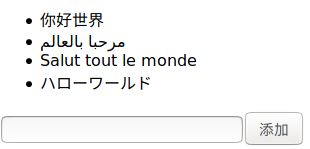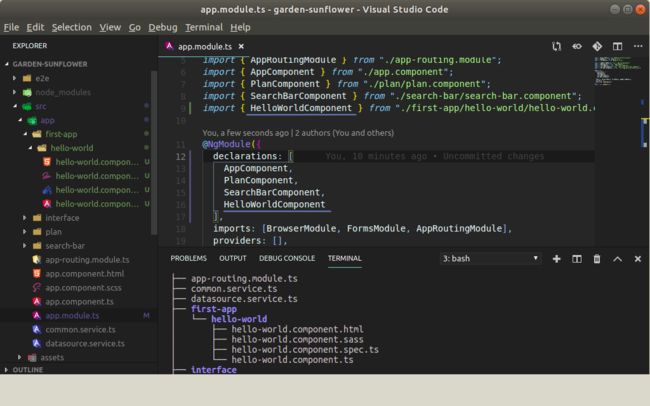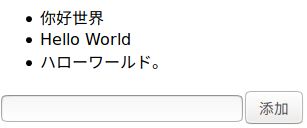AngularJs 8 快速开发
目录
- 项目结构简述。
- 创建一个 component。
- 创建一个 service。
- http 请求数据。
- 附 GitHub 源码
1. 项目结构简述
.
├── angular.json
├── e2e
├── node_modules
├── package.json
├── src
└── tsconfig.json
angular.json 是 ng 8 的配置文件。
src 几乎我们所有的代码相关操作都在这个里面
e2e 测试使用 其他的一般不会用到
2. 创建一个 component
2.1创建
创建一个组件的命令 ng g c helloWorld
在终端输入命令(目录在项目根目录即可)
有一些默认属性需要注意
默认新建的组件、服务、守卫…都会放在 src -> app 目录下,为了演示,我们把所有的操作都放在一个叫做 first-app 的目录下吧。
ng g c first-app/helloWorld
目录不用提前创建
robinu@bey-pc:~/workspace/ng.apps/garden-sunflower$ ng g c first-app/helloWorld
CREATE src/app/first-app/hello-world/hello-world.component.sass (0 bytes)
CREATE src/app/first-app/hello-world/hello-world.component.html (30 bytes)
CREATE src/app/first-app/hello-world/hello-world.component.spec.ts (657 bytes)
CREATE src/app/first-app/hello-world/hello-world.component.ts (289 bytes)
UPDATE src/app/app.module.ts (699 bytes)
好了。
├── first-app
│ └── hello-world
│ ├── hello-world.component.html
│ ├── hello-world.component.sass
│ ├── hello-world.component.spec.ts
│ └── hello-world.component.ts
4 个创建 1 个更新。
4 个创建分别是 样式文件、 html文件、spec.ts测试文件、.ts文件
1 个更新是在当前 module 自动引入了我们新建的组件,可以打开 app.module.ts 查看。
需要注意的是,任何新建的组件想要在当前 module 中被使用,都必须在当前 module 中引入。这个在操作多个 module 时,会有体会。
2.2 修改
2.2.1 在壳组件中添加 hello-world 组件
app.component 组件即壳组件,他是应用程序执行后默认加载组件。
壳组件同样默认由 4 个文件组成。
将如下内容写入 app.component.html 中:
这个标签就是我们新建的 hello world 组件,名字是从 hello-world.component.ts 文件的 @Component 装饰器的 selector 选择器的值中获取的。app- 是 cli 默认添加的前缀
@Component({
selector: 'app-hello-world',
2.2.2 修改 hello-world 组件
你好世界
2.2.3 查看效果
ng s -o
我这里就不贴图了。
3. 创建一个 service
3.1 创建
ng g s first-app/hello-world/helloWorld
我们在 hello-world 文件夹创建了一个 hello world 组件的 service
当然,这只是我们主观意识上的 component 与 service 的关系,实际上他们目前只能算是住在同一个屋子里的两个互相不认识的人,妙的是碰巧俩人都姓 hello-world。
关于 service
service 目前可以大致理解为处理业务的脚本文件。他们通常带有可注入装饰器(@Injectable())并以注入的形式被使用。
component 和 service 都是 class,只是通过不同的装饰器获得了不同的表现。
3.2 说明
我们来做一个多语言的 hello world 列表,数据由 service 提供,由 component 展示,也顺便做一个插入新的 hello world 到 service 中的 hello world 列表的业务。
service
- service 需要一个 string[],存放 hello world
component
- component 需要使用 ngFor 渲染 hello world
- component 需要提供 添加 hello world 的方式
3.3 修改 service
hello-world.service.ts
import { Injectable } from "@angular/core";
@Injectable({
providedIn: "root"
})
export class HelloWorldService {
/**
* hello world 列表
*/
public helloWorlds: string[] = [];
constructor() {}
/**
* 初始化数据
*/
public init(): void {
this.helloWorlds = ["你好世界", "مرحبا بالعالم", "Salut tout le monde"];
}
}
3.4 修改 component
hello-world.component.ts
import { Component, OnInit } from "@angular/core";
import { HelloWorldService } from "./hello-world.service";
@Component({
selector: "app-hello-world",
templateUrl: "./hello-world.component.html",
styleUrls: ["./hello-world.component.sass"]
})
export class HelloWorldComponent implements OnInit {
public hd: string = "";
constructor(public hwS: HelloWorldService) {}
ngOnInit() {
this.hwS.init();
}
public append(): void {
if (this.hd.trim() === "") return;
this.hwS.helloWorlds.push(this.hd);
this.hd = "";
}
}
hello-world.component.html
-
{{item}}
需要注意的是,这里使用了双向绑定如果这里报错
Can't bind to 'ngModel' since it isn't a known property of 'input'
那就需要在 app.module.ts 中引入 FormsModule
...
import { FormsModule } from "@angular/forms";
...
imports: [..., FormsModule, ...],
...
至此,就可以正常运行了,如果你的 ng s 仍在运行,刷新页面即可。

4. http 请求数据
4.1 说明
现在我们的数据是从 service.init 中填写的,现在我们要把他修改为从外部获取数据。
由于目前没有 api 可用(你也可以自己写一个来实际尝试),因此我们采用请求 json 文件的形式来获取数据。当然其效果是相同的。
4.2 新建 json 文件
在 src/assets 目录下,新建一个 datasource.json 文件。
{
"helloWorlds": [
"你好世界",
"Hello World"
]
}
4.3 引入 HttpClientModule
app.module.ts
import { BrowserModule } from "@angular/platform-browser";
import { NgModule } from "@angular/core";
import { FormsModule } from "@angular/forms";
import { HttpClientModule } from "@angular/common/http"; /** here */
import { AppRoutingModule } from "./app-routing.module";
import { AppComponent } from "./app.component";
import { PlanComponent } from "./plan/plan.component";
import { SearchBarComponent } from "./search-bar/search-bar.component";
import { HelloWorldComponent } from "./first-app/hello-world/hello-world.component";
@NgModule({
declarations: [
AppComponent,
PlanComponent,
SearchBarComponent,
HelloWorldComponent
],
imports: [
BrowserModule,
FormsModule,
AppRoutingModule,
HttpClientModule /** here */
],
providers: [],
bootstrap: [AppComponent]
})
export class AppModule {}
4.4 修改 service
hello-world.service.ts
import { Injectable } from "@angular/core";
import { HttpClient } from "@angular/common/http";
@Injectable({
providedIn: "root"
})
export class HelloWorldService {
/**
* hello world 列表
*/
public helloWorlds: string[] = [];
readonly url = "assets/datasource.json";
constructor(private _http: HttpClient) {}
/**
* 初始化数据
*/
public init(): void {
this._http.get(this.url).subscribe((data: { helloWorlds: string[] }) => {
this.helloWorlds = data.helloWorlds;
});
}
}
4.5 查看效果
至此
新建 component、新建 service、HttpClient Restfull 获取数据,都已经有涉及到了,也提到了一点双向绑定,代码可能会有不合理的地方,欢迎大家来指正,也希望能帮到看过此篇的童鞋。
5. GitHub
项目源码

